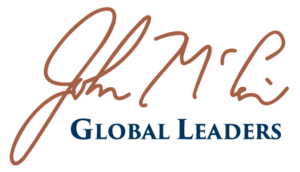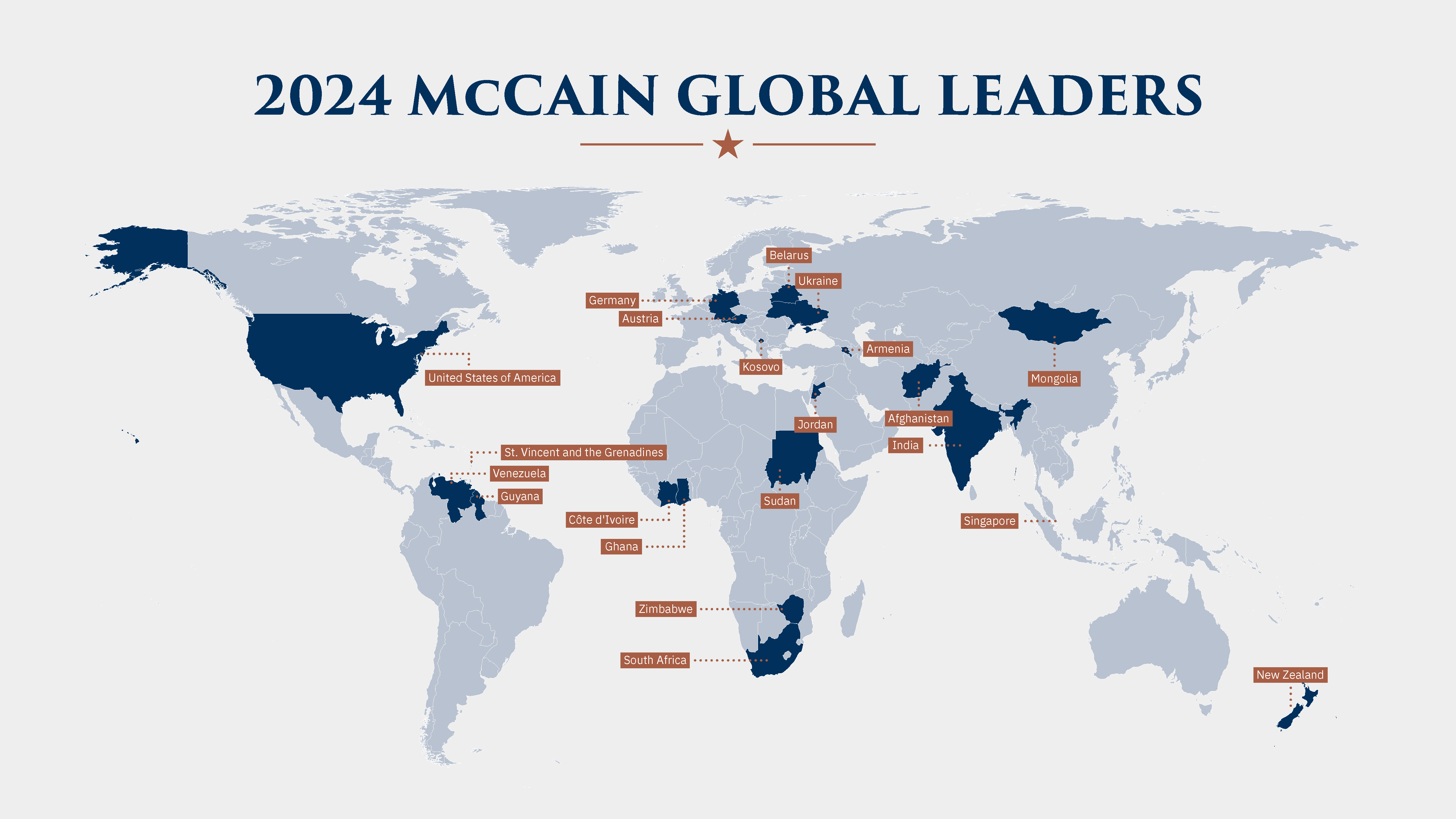McCain Global Leaders Program


Preparing Today’s Leaders to Meet Tomorrow’s Challenges:
The McCain Global Leaders Program supports character-driven leaders from around the world who embody Senator John McCain’s legacy of serving a cause greater than oneself. Structured as a 12-month fellowship and immersive learning experience, each cohort will include a diverse group of 25 leaders from around the world who are working “in the arena” to advance democracy, human rights, and freedom. The program is designed to advance each Leader’s personal and professional leadership journey and impact by providing training, resources, and access to highly relevant regional and global networks with the goal of preparing today’s leaders to meet tomorrow’s challenges.
A Regional and Global Approach:
To adapt to and meet the needs of an ever-changing and complex global environment, the McCain Institute will determine a global thematic focus area as well as technical areas of focus for each region and recruit participants who work on relevant issues related to each theme. Throughout the 12-month program, the Leaders will participate in programming that is both regional and global with the goal of connecting them to a highly relevant and targeted professional peer group in their home region, as well as a broader and diverse network of global peers.
2025 Global Theme: Advancing Democracy and Human Rights
The McCain Institute recognizes the ever-changing and complex global landscape as it relates to great-power competitions, the spread of authoritarianism, threats to democracy, abuse of human rights and growing challenges to the health of our planet driven by climate change. It also recognizes that 2025 will bring unprecedented change and challenge to the global community because of recent and upcoming elections occurring around the world as well as conflict occurring in numerous regions. The McCain Institute will seek to identify a diverse cohort of leaders who are working to advance democracy and human rights in their home countries through a variety of professions and projects.
2025 Regional Themes
Western Hemisphere: Protecting the Human Rights of Migrants
The Western Hemisphere will bring together those who are working to reduce push factors related to migration as well as those who are working on policy and frontline efforts related to migration flows in the Western Hemisphere. The regional theme will focus on what policy and what efforts can be done to humanize the migration process and reduce risk factors related to the safety, health and well-being of migrants.
Europe and Eurasia: Countering the Spread of Authoritarianism
Democratic backsliding and interference from Russia continue to sow instability throughout Europe and Eurasia. The regional cohort will focus on internal and external threats to democracy posed by disinformation, disregard for state sovereignty as well as rising nationalism and extremism. It will also focus on proactive solutions to these threats and expose the cohort to broader networks that can help advance democracy and human rights throughout the region.
Africa and the Middle East: Building the Foundations for Conflict Resolution
Conflict persists through the Africa and Middle East region and young leaders are being called upon to identify solutions for resolution. The regional cohort will examine factors driving conflict, the humanitarian consequences and what steps can be done to pave a path towards resolution and reconciliation. The cohort will learn from regional case studies and build a network of experts across Africa and the Middle East in an effort to build a foundation that can support participants in their own work related to conflict resolution.
Asia and Oceania: Managing the Great Power Competition in the Asia-Pacific
China and the United States continue to compete for economic and security interests throughout the Asia-Pacific region and beyond. The regional cohort will focus on the various threats to economic and political stability that persist throughout the region as well as to how advancing democracy and human rights can counter the instability created by the great power competition. This will be done through a case study of country within the region and by building a network of support throughout the region.
Following in the footsteps of Senator John McCain’s legacy of being on the front lines of defending and advocating for democracy, freedom, and human rights, Leaders will embark on a journey that will help provide them with the tools needed to be champions of democracy in their home country and region.
Connecting Leaders from Around the World:
Leaders are selected through a competitive, open recruitment process. There are up to 25 Leaders per annual cohort broken into 4 regional groupings. Though there is no age requirement, Leaders are typically between the ages of 25 and 45. Leaders should possess a strong track record of serving a cause greater than oneself as well as experience working directly on the global theme of defending democracy and their respective regional theme. The McCain Institute emphasizes diversity in the form of gender, ethnicity, persons with disabilities, political viewpoint, economic background, and education.
Cohort 2025 Programming Schedule
Leaders will participate in three impactful in-person events, which will be enhanced by online learning. They include expert-led practical skills trainings and an integrated leadership development curriculum inspired by Senator McCain’s legacy and emphasizes peer-mentoring and group problem-solving.
Summer 2025
The McCain Leadership Curriculum: Throughout the program, Leaders participate in a curriculum that is administered both online and in person. The curriculum is designed to incorporate lessons and experiences from Senator McCain’s life, to reinforce and augment in-person engagements and to focus on community building and group problem-solving. A central tenet of the curriculum is a dynamic peer-mentorship model, through which the Leaders support each other’s journeys directly. The curriculum will help each leader chart their own journey as a changemaker while also imparting real-world skills that will assist leaders as they take on some of the most difficult challenges facing their home country and region.
Fall 2025
(Annapolis, M.D. and Washington, D.C.): The first in-person event of the program, the Leadership Experience, brings together all participants for the first time at the U.S. Naval Academy in Annapolis, Md., and in Washington, D.C. The 10-day long program exposes leaders to the principles that guided Senator McCain’s leadership approach and connects them with experts in their core thematic areas and with key decision-makers. Leaders will also work together and with experts to establish their own leadership philosophy and goals.
Winter 2025/2026
The Changemaker Tour (Host Country in Each Region): The second in-person event of the program convenes each regional cohort and members of the Global Advisory Council for five-day regional study tours that provide exposure to the global theme of defending democracy in a host country and focuses on developing targeted regional connections and networks, while providing the opportunity to discuss solutions and ideas related to the theme. Leaders will be encouraged, but not required, to explore regional professional collaborations – the McCain Institute will actively support any resulting collaborations. There will be one Changemaker Tour for the participants in each respective region. Past Changemaker Tours have occurred in Colombia, Poland, Singapore, and South Africa.
Spring 2026
The Legacy Experience (Vietnam): The capstone program of the 10-month journey will, for a second time, bring all Leaders together in a country of significance to Senator McCain’s own leadership journey. The Legacy Experience will take place in Vietnam and examine the journey and relationship between Senator McCain and the people of Vietnam. During this seven-day trip, Leaders, MGL Alumni and members of the Global Advisory Council will convene to reflect on their experience during the program, share how their own leadership philosophies have evolved, explore professional collaborations, outline the next steps of their leadership journey, and learn about the resources that they can access as program alumni.
The 2025 application window is open until February 21, 2025.
If you have a question, please email [email protected].